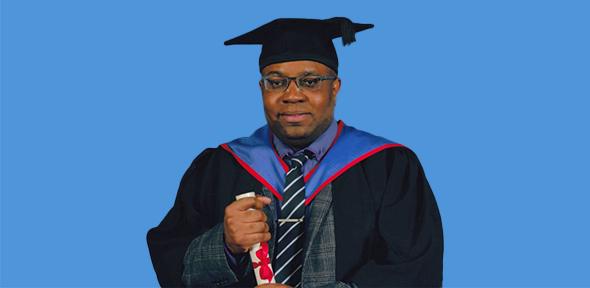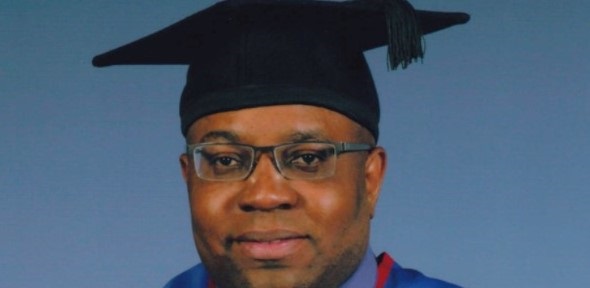
Submitted by Alexandra Collett on Wed, 07/02/2024 - 10:38
Despite huge setbacks in his health, Dr Calbert Graham has successfully completed his Level 7 Apprenticeship in Digital and Technology Solutions and an MSc in Data Science, achieving a distinction in both.
Studying at the Queen Mary University of London, Dr Graham explained he chose to pursue an apprenticeship in data science, as a computational linguist and at this point in his career, due to the increasing convergence of linguistic analysis and data-driven methodologies. Currently Dr Graham is a Researcher in the Linguistics Department within the University of Cambridge.
Dr Graham faced many obstacles whilst studying, including how to adapt to learning from home during the Covid-19 pandemic and contracting the virus himself, which resulted in him tackling long Covid, for nearly a year and having to take a huge amount of time off, to recover. Despite huge setbacks in his health, Dr Calbert Graham has successfully completed his Level 7 Apprenticeship in Digital and Technology Solutions and an MSc in Data Science, achieving a Distinction in both.
Colin Long, Apprenticeships Manager from HR praised Dr Graham for his perseverance and completing the course, he said:
“Dr Calbert Graham's outstanding achievement highlights his resilience and dedication, he successfully completed an MSc in Data Science and a Level 7 Apprenticeship in Digital and Technology Solutions, earning distinctions in both, but he has done so amidst unprecedented challenges. As a Leverhulme Early Career Research Fellow & Senior Research Associate in the Faculty of Modern and Medieval Languages and Linguistics, he's among the first academics to accomplish a senior-level apprenticeship at the University of Cambridge. Celebrating his success, we recognize an exceptional individual, and we congratulate Dr. Calbert Graham on these well-deserved qualifications gained at Queen Mary University London.”
Dr Graham has reflected on his time, studying for the Apprenticeship, he said: "My experience as an apprentice in data science has been nothing short of transformative. The intellectually challenging MSc programme provided by the training provider not only expanded my technical toolkit but also fostered a deep understanding of the ethical considerations integral to this field. “The hands-on projects allowed me to apply theoretical knowledge in real-world scenarios, enhancing my problem-solving skills. The mentorship and support I received were instrumental in navigating complex concepts, creating a supportive learning environment. This apprenticeship has not only prepared me for the dynamic landscape of data science but has also instilled a passion for continuous learning and innovation.”
Professor John Williams, Director of Section Linguistics, said:
“We in Theoretical and Applied Linguistics are very proud of Calbert’s progression from MPhil/PhD student, through postdoctoral researcher in phonetics and second language acquisition to computational speech scientist – a true object lesson in intellectual development, upskilling, and sheer determination. We are particularly appreciative because he has taken on the teaching and management of our core undergraduate Computational Linguistics course this year! Calbert is a great asset to language sciences in Cambridge.”
When asked what were the highlights during his time completing the apprenticeship, Dr Graham praised the provider’s continuous assistance, he said: “I really appreciated the support that they provided. When I became ill, they added extra support, everybody had a tutor or some person there to check on your learning progress.
“I would like to extend my sincere thanks to Ms Miriam Lowe, in particular, for the invaluable support she provided in helping me to get my learning fully back on track following the disruption caused by my illness.
Dr Graham also praised the HR PPD Apprenticeship team for their support when he fell ill and said: “I want to extend my heartfelt thanks to Leonie and Colin for their invaluable support during my part time studies. Their encouragement meant a great deal to me, and I am truly grateful.”
Leonie Issacson, Head of Learning and Development, in HR said:
“Warm congratulations to Calbert for successfully completing an MSc in Data Science and Level 7 Apprenticeship in Digital and Technology Solutions, with a distinction in both qualifications. Calbert is one of the first academics at Cambridge to have successfully completed a postgraduate level apprenticeship. This is an excellent example of the Apprenticeship levy being used to fully fund a nationally recognised professional development qualification. “It is particularly pleasing to see Calbert’s hard work and dedication rewarded with these results. Calbert faced considerable challenges during the programme which was instigated during covid, with ill-health impacting progress. The PPD Apprenticeship team were pleased to be able to support Calbert in identifying the right programme for him and throughout his apprenticeship. "
Dr Graham reflected more on the Apprenticeship and said: “I think in terms of the Apprenticeship course itself- being first and foremost an academic- I'm always looking at the programme itself and it was robust and very comprehensive. “The programme covered all the fundamental areas of data science, while also allowing flexibility for you to personalise it and choose research pathways that are most relevant to your professional goals and interests.”
What’s next:-
Dr Graham: “Armed with the comprehensive skills and knowledge gained through the data science apprenticeship, my next steps involve applying these capabilities to real-world challenges and to my research projects. “I’m eager to contribute to projects that leverage my expertise in computational linguistics, second language education, (particularly automated language assessment) and data science, with a focus on innovative solutions and advancements. For example, in using generative AI in content creation to enhance the experience of second language learners.
“Networking within the data science community, attending industry events, and engaging with professionals will be essential in staying abreast of the latest trends and technologies. “I also plan to continuously expand my skill set by exploring emerging research theme in deep learning and natural language processing, ensuring that I remain at the forefront of technological advancements in the field. “Additionally, considering the dynamic nature of the data science landscape, pursuing ongoing professional development and relevant collaborations to keep up with advancements in the area. “Ultimately, my goal is to contribute meaningfully to data-driven decision-making processes and continue pushing the boundaries of what can be achieved at the intersection of computational linguistics, theoretical & applied linguistics, language learning, and data science.”
Q+A continued:-
What did you learn:-
“Throughout the data science apprenticeship, I have acquired a diverse skill set and a profound understanding of key concepts in the field. From mastering statistical analysis techniques to gaining proficiency in machine learning algorithms, I have learned to navigate and extract meaningful insights from extensive datasets. “Practical application of these skills through challenging projects/tasks has deepened my comprehension of the end-to-end data science workflow, encompassing data cleaning, feature engineering, model development, and interpretation. “Proficient use of programming languages like Python, R, and SQL for data manipulation and visualisation has become second nature, enhancing my ability to convey complex findings to both technical and non-technical audiences. “Additionally, the programme's emphasis on ethical considerations in data science has broadened my perspective, making me conscious of the importance of responsible and transparent practices in this evolving field. “Overall, the apprenticeship has not only expanded my technical toolkit but has also fostered critical thinking and ethical decision-making, equipping me for meaningful contributions in the realm of data science.”
More Detail on why Dr Calbert chose to do the Apprenticeship:-
"The dynamic nature of the field, coupled with a growing demand for professionals who can bridge the gap between language understanding and data insights, makes this apprenticeship a strategic choice. “The programme's emphasis on both the theoretical and coding aspects of data science aligns perfectly with my goal of translating theoretical knowledge into practical skills. “This opportunity allows me to augment my expertise in computational linguistics with proficiency in statistical analysis, machine learning, cloud computing, big data processing, Bayesian risk and decision making for data science and AI, data visualisation and other courses.
“I am enthusiastic about contributing to innovative applications that leverage both linguistic insights and data science techniques, and I believe this apprenticeship is the ideal platform to propel my career to new heights.”
There are over 690 different apprenticeships to choose from and funding through the Apprenticeship Levy is available to University staff at all levels and ages.
For further information please view the University Apprenticeship website or contact: apprenticeshps@admin.cam.ac.uk

